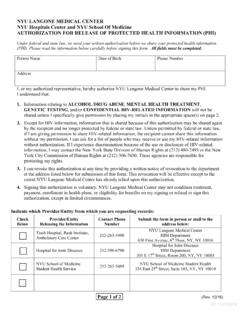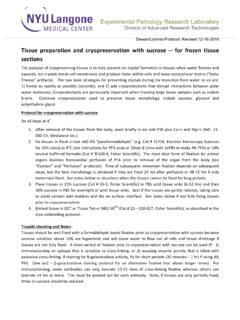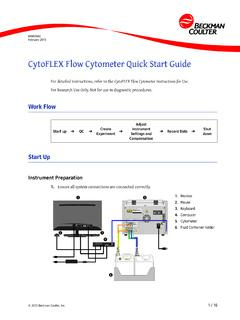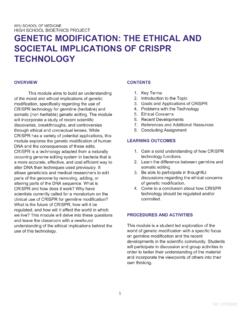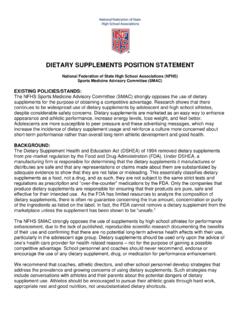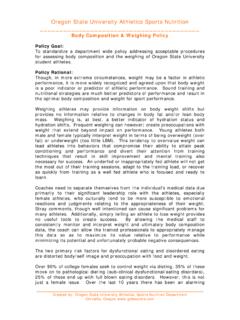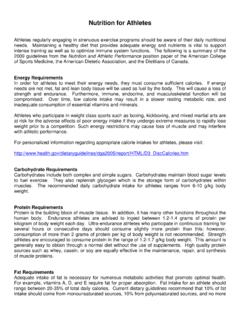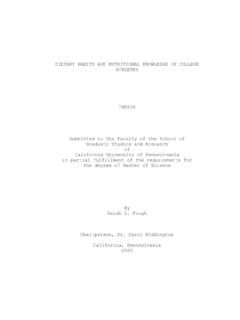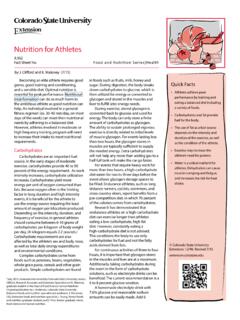Transcription of Nutrition and Athletic Performance - NYU Langone …
1 Nutrition andAthletic PerformanceABSTRACTIt is the position of the American Dietetic Association, Dietitians ofCanada, and the American College of Sports Medicine that physical ac-tivity, Athletic Performance , and recovery from exercise are enhanced byoptimal Nutrition . These organizations recommend appropriate selection offood and fluids, timing of intake, and supplement choices for optimal healthand exercise Performance . This position paper reviews the current scientificdata related to the energy needs of athletes, assessment of body composi-tion, strategies for weight change, the nutrient and fluid needs of athletes,special nutrient needs during training, the use of supplements and nutri-tional ergogenic aids, and the Nutrition recommendations for vegetarianathletes.
2 During times of high physical activity, energy and macronutrientneeds especially carbohydrate and protein intake must be met in orderto maintain body weight, replenish glycogen stores, and provide adequateprotein for building and repair of tissue. Fat intake should be adequate toprovide the essential fatty acids and fat-soluble vitamins, as well as to helpprovide adequate energy for weight maintenance. Overall, diets shouldprovide moderate amounts of energy from fat (20% to 25% of energy);however, there appears to be no health or Performance benefit to consum-ing a diet containing less than 15% of energy from fat. Body weight andcomposition can affect exercise Performance , but should not be used as thesole criterion for sports Performance ; daily weigh-ins are adequate food and fluid before, during, and after exercise canhelp maintain blood glucose during exercise, maximize exercise perfor-mance, and improve recovery time.
3 Athletes should be well-hydratedbefore beginning to exercise; athletes should also drink enough fluid duringand after exercise to balance fluid losses. Consumption of sport drinkscontaining carbohydrates and electrolytes during exercise will provide fuelfor the muscles, help maintain blood glucose and the thirst mechanism, anddecrease the risk of dehydration or hyponatremia. Athletes will not needvitamin and mineral supplements if adequate energy to maintain bodyweight is consumed from a variety of foods. However, supplements may berequired by athletes who restrict energy intake, use severe weight-losspractices, eliminate one or more food groups from their diet, or consumehigh-carbohydrate diets with low micronutrient density.
4 Nutritional ergo-genic aids should be used with caution, and only after careful evaluation ofthe product for safety, efficacy, potency, and whether or not it is a bannedor illegal substance. Nutrition advice, by a qualified Nutrition expert, shouldonly be provided after carefully reviewing the athlete s health, diet, sup-plement and drug use, and energy Sci. Sports 32, No. 12, pp. 2130 2145;J. Am. Diet. 12, pp. 1543 1556. 2000;Diet of CanadaVol. 61, pp. the past 20 years, research has clearly docu-mented the beneficial effects of Nutrition on exer-cise Performance . There is no doubt that what anathlete eats and drinks can affect health, body weight andcomposition, substrate availability during exercise, recoverytime after exercise, and, ultimately, exercise the research and interest in sport Nutrition has increased,so has the sale of ergogenic aids, supplements, herbal prep-arations, and diet aids, all aimed at improving sports per-formance.
5 The manufacturers of these products frequentlymake unsubstantiated claims to entice the athlete to use theirproducts. The athlete who wants to optimize exercise per-formance needs to follow good Nutrition and hydrationpractices, use supplements and ergogenic aids carefully,minimize severe weight loss practices, and eat a variety offoods in adequate position is focused on adult athletes, rather thanchildren or adolescents, and does not focus on any particulartype of athlete or Athletic event. Moreover, the position isintended to provide guidance to dietetics and health profes-sionals working with athletes, and is not directed to indi-vidual athletes STATEMENTIt is the position of the American Dietetic Association,Dietitians of Canada, and the American College of SportsMedicine that physical activity, Athletic Performance , andrecovery from exercise are enhanced by optimal organizations recommend appropriate selection offood and fluids, timing of intake, and supplement choicesfor optimal health and exercise joint position statement was authored by the American College ofSports Medicine, the American Dietetic Association, and the Dietitians ofCanada.
6 And content appears in ADA style ( skin-fold). Individualname recognition is reflected in the acknowledgments at the end of & SCIENCE IN SPORTS & EXERCISE Copyright 2000 by the American College of Sports Medicine,the American Dietetic Association, and the Dietitians of Canada2130 KEY POINTSThe following key points summarize the current energy,nutrient, and fluid recommendations for active adults andcompetitive athletes noted in this position paper. Sport nu-trition experts can further adjust these general recommen-dations to accommodate the unique concerns of individualathletes regarding health, sports, nutrient needs, food pref-erences, and body weight and body composition times of high-intensity training, adequate en-ergy needs to be consumed to maintain body weight, max-imize the training effects, and maintain health.
7 Low-energyintakes can result in loss of muscle mass, menstrual dys-function, loss or failure to gain bone density, and increasedrisk of fatigue, injury, and weight and composition can affect exercise per-formance but should not be used as the sole criterion forparticipation in sports; daily weigh-ins are body-fat levels vary depending upon the sex, age,and heredity of the athlete, as well as the sport assessment techniques have inherent variability,thus limiting the precision with which they can be inter-preted. If weight loss (fat loss) is desired, it should startearly before the competitive season and involve atrained health and Nutrition are important to maintain blood-glucoselevels during exercise and to replace muscle glycogen.
8 Rec-ommendations for athletes range from 6 to 10 g/kg bodyweight per day. The amount required depends upon theathlete s total daily energy expenditure, type of sport per-formed, sex of the athlete, and environmental requirements are slightly increased in highlyactive people. Protein recommendations for endurance ath-letes are to g/kg body weight per day, whereas thosefor resistance and strength-trained athletes may be as high to g/kg body weight per day. These recommendedprotein intakes can generally be met through diet alone,without the use of protein or amino acid supplements, ifenergy intake is adequate to maintain body intake should not be restricted, because there is noperformance benefit in consuming a diet with less than 15%of energy from fat, compared with 20% to 25% of energyfrom fat.
9 Fat is important in the diets of athletes as itprovides energy, fat-soluble vitamins, and essential fattyacids. Additionally, there is no scientific basis on which torecommend high-fat diets to athletes at greatest risk of micronutrient deficien-cies are those who restrict energy intake or use severeweight-loss practices, eliminate one or more food groupsfrom their diet, or consume high-carbohydrate diets withlow micronutrient density. Athletes should strive to con-sume diets that provide at least the RDAs/DRIs for allmicronutrients from decreases exercise Performance ; thus, ad-equate fluid before, during, and after exercise is necessaryfor health and optimal Performance . Athletes should drinkenough fluid to balance their fluid losses.
10 Two hours beforeexercise 400 to 600 mL (14 to 22 oz) of fluid should beconsumed, and during exercise 150 to 350 mL (6 to 12 oz)of fluid should be consumed every 15 to 20 min dependingon tolerance. After exercise the athlete should drink ade-quate fluids to replace sweat losses during exercise. Theathlete needs to drink at least 450 to 675 mL (16 to 24 oz)of fluid for every pound ( kg) of body weight lost exercise, a meal or snack should provide suffi-cient fluid to maintain hydration, be relatively low in fat andfiber to facilitate gastric emptying and minimize gastroin-testinal distress, be relatively high in carbohydrate to max-imize maintenance of blood glucose, be moderate in protein,and be composed of foods familiar and well tolerated by exercise, the primary goals for nutrient con-sumption are to replace fluid losses and provide carbohy-drate (approximately 30 to 60 g per h) for the maintenanceof blood glucose levels.




